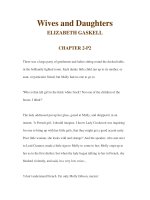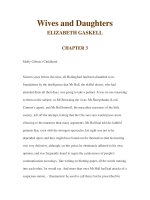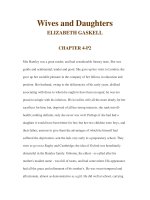Wives and Daughters ELIZABETH GASKELL CHAPTER 6-P1 pps
Bạn đang xem bản rút gọn của tài liệu. Xem và tải ngay bản đầy đủ của tài liệu tại đây (32.58 KB, 13 trang )
Wives and Daughters
ELIZABETH GASKELL
CHAPTER 6-P1
A Visit To The Hamleys
Of course the news of Miss Gibson's approaching departure had spread through
the household before the one o'clock dinner-time came; and Mr Coxe's dismal
countenance was a source of much inward irritation to Mr Gibson, who kept
giving the youth sharp glances of savage reproof for his melancholy face, and
the want of appetite; which he trotted out, with a good deal of sad ostentation;
all of which was lost upon Molly, who was too full of her own personal
concerns to have any thought or observation to spare from them, excepting once
or twice when she thought of the many days that must pass over before she
should again sit down to dinner with her father.
When she named this to him after the meal was over, and they were sitting
together in the drawing-room, waiting for the sound of the wheels of the
Hamley carriage, he laughed, and said, -
'I'm coming over to-morrow to see Mrs Hamley; and I dare say I shall dine at
their lunch; so you won't have to wait long before you've the treat of seeing the
wild beast feed.'
Then they heard the approaching carriage.
'Oh, papa,' said Molly, catching at his hand, 'I do so wish I was not going, now
that the time is come.'
'Nonsense; don't let us have any sentiment. Have you got your keys? that's more
to the purpose.'
Yes; she had got her keys, and her purse; and her little box was put up on the
seat by the coachman; and her father handed her in; the door was shut, and she
drove away in solitary grandeur, looking back and kissing her hand to her
father, who stood at the gate, in spite of his dislike of sentiment, as long as the
carriage could be seen. Then he turned into the surgery, and found Mr Coxe had
had his watching too, and had, indeed, remained at the window gazing,
moonstruck, at the empty road, up which the young lady had disappeared. Mr
Gibson startled him from his reverie by a sharp, almost venomous, speech about
some small neglect of duty a day or two before. That night Mr Gibson insisted
on passing by the bedside of a poor girl whose parents were worn-out by many
wakeful anxious nights succeeding to hard working days.
Molly cried a little, but checked her tears as soon as she remembered how
annoyed her father would have been at the sight of them. It was very pleasant
driving quickly along in the luxurious carriage, through the pretty green lanes,
with dog-roses and honeysuckles so plentiful and rathe in the hedges, that she
once or twice was tempted to ask the coachman to stop till she had gathered a
nosegay. She began to dread the end of her little journey of seven miles; the
only drawback to which was, that her silk was not a true clan-tartan, and a little
uncertainty as to Miss Rose's punctuality, At length they came to a village;
straggling cottages lined the road, an old church stood on a kind of green, with
the public-house close by it; there was a great tree, with a bench all round the
trunk, midway between the church gates and the little inn. The wooden stocks
were close to the gates. Molly had long passed the limit of her rides, but she
knew this must be the village of Hamley, and they must be very near to the hall.
They swung in at the gates of the park in a few minutes, and drove up through
meadow-grass, ripening for hay, - it was no grand aristocratic deer-park this - to
the old red-brick hall; not three hundred yards from the high-road. There had
been no footman sent with the carriage, but a respectable servant stood at the
door, even before they drew up, ready to receive the expected visitor, and take
her into the drawing-room where his mistress lay awaiting her.
Mrs Hamley rose from her sofa to give Molly a gentle welcome; she kept the
girl's hand in hers after she had finished speaking, looking into her face, as if
studying it, and unconscious of the faint blush she called up on the otherwise
colourless cheeks.
'I think we shall be great friends,' said she, at length. 'I like your face, and I am
always guided by first impressions. Give me a kiss, my dear.'
It was far easier to be active than passive during this process of 'swearing
eternal friendship,' and Molly willingly kissed the sweet pale face held up to
her.
'I meant to have gone and fetched you myself; but the heat oppresses me, and I
did not feel up to the exertion. I hope you had a pleasant drive?'
'Very,' said Molly, with shy conciseness.
'And now I will take you to your room; I have had you put close to me; I
thought you would like it better, even though it was a smaller room than the
other.'
She rose languidly, and wrapping her light shawl round her yet elegant figure,
led the way upstairs. Molly's bedroom opened out of Mrs Hamley's private
sitting-room; on the other side of which was her own bedroom. She showed
Molly this easy means of communication, and then, telling her visitor she would
await her in the sitting-room, she closed the door, and Molly was left at leisure
to make acquaintance with her surroundings.
First of all, she went to the window to see what was to be seen. A flower-garden
right below; a meadow of ripe grass just beyond, changing colour in long
sweeps, as the soft wind blew over it; great old forest-trees a little on one side;
and, beyond them again, to be seen only by standing very close to the side of the
window-sill, or by putting her head out, if the window was open, the silver
shimmer of a mere, about a quarter of a mile off. On the opposite side to the
trees and the mere, the look-out was bounded by the old walls and high-peaked
roofs of the extensive farm-buildings. The deliciousness of the early summer
silence was only broken by the song of the birds, and the nearer hum of bees.
Listening to these sounds, which enhanced the exquisite sense of stillness, and
puzzling out objects obscured by distance or shadow, Molly forgot herself, and
was suddenly startled into a sense of the present by a sound of voices in the next
room - some servant or other speaking to Mrs Hamley. Molly hurried to unpack
her box, and arrange her few clothes in the pretty old-fashioned chest of
drawers, which was to serve her as dressing-table as well. All the furniture in
the room was as old-fashioned and as well-preserved as it could be. The chintz
curtains were Indian calico of the last century - the colours almost washed out,
but the stuff itself exquisitely clean. There was a little strip of bedside carpeting,
but the wooden flooring, thus liberally displayed, was of finely- grained oak, so
firmly joined, plank to plank, that no grain of dust could make its way into the
interstices. There were none of the luxuries of modern days; no writing-table, or
sofa, or pier-glass. In one corner of the walls was a bracket, holding an Indian
jar filled with pot-pourri; and that and the climbing honeysuckle outside the
open window scented the room more exquisitely than any toilette perfumes.
Molly laid out her white gown (of last year's date and size) upon the bed, ready
for the (to her new) operation of dressing for dinner, and having arranged her
hair and dress, and taken out her company worsted-work,' she opened the door
softly, and saw Mrs Hamley lying on the sofa.
'Shall we stay up here, m dear? I think it is pleasanter than down below; and
then I shall not have to come upstairs again at dressing-time.'
'I shall like it very much,' replied Molly.
'Ah! you've got your sewing, like a good girl,' said Mrs Hamley. 'Now, I don't
sew much. I live alone a great deal. You see, both my boys are at Cambridge,
and the squire is out of doors all day long - so I have almost forgotten how to
sew. I read a great deal. Do you like reading?'
'It depends upon the kind of book,' said Molly. 'I'm afraid I don't like "steady
reading," as papa calls it.'
'But you like poetry!' said Mrs Hamley, almost interrupting Molly. 'I was sure
you did, from your face. Have you read this last poem of Mrs Hemans? Shall I
read it aloud to you?'
So she began. Molly was not so much absorbed in listening but that she could
glance round the room. The character of the furniture was much the same as in
her own. Old-fashioned, of handsome material, and faultlessly clean; the age
and the foreign appearance of it gave an aspect of comfort and picturesqueness
to the whole apartment. On the walls there hung some crayon sketches -
portraits. She thought she could make out that one of them was a likeness of
Mrs Hamley, in her beautiful youth. And then she became interested in the
poem, and dropped her work, and listened in a manner that was after Mrs
Hamley's own heart. When the reading of the poem was ended, Mrs Hamley
replied to some of Molly's words of admiration, by saying, -
'Ah! I think I must read you some of Osborne's poetry some day; under seal of
secrecy, remember; but I really fancy they are almost as good as Mrs Hemans'.'
To be 'nearly as good as Mrs Hemans" was saying as much to the young ladies
of that day, as saying that poetry is nearly as good as Tennyson's would be in
this. Molly looked up with eager interest.
'Mr Osborne Hamley? Does your son write poetry?'
'Yes. I really think I may say he is a poet. He is a very brilliant, clever young
man, and he quite hopes to get a fellowship at Trinity. He says he is sure to be
high up among the wranglers, and that he expects to get one of the Chancellor's
medals. That is his likeness - the one hanging against the wall behind you.'
Molly turned round, and saw one of the crayon sketches - representing two
boys, in the most youthful kind of jackets and trousers, and falling collars. The
elder was sitting down, reading intently. The younger was standing by him, and
evidently trying to call the attention of the reader off to some object out of doors
- out of the window of the very room in which they were sitting, as Molly
discovered when she began to recognize the articles of furniture faintly
indicated in the picture.
'I like their faces!' said Molly. 'I suppose it is so long ago now, that I may speak
of their likenesses to you as if they were somebody else; may not I?'
'Certainly,' said Mrs Hamley, as soon as she understood what Molly meant. 'Tell
me just what you think of them, my dear; it will amuse me to compare your
impressions with what they really are.'
'Oh! but I did not mean to guess at their characters. I could not do it; and it
would be impertinent, if I could. I can only speak about their faces as I see them
in the picture.'
'Well! tell me what you think of them!'
'The eldest - the reading boy - is very beautiful; but I can't quite make out his
face yet, because his head is down, and I can't see the eyes. That is the Mr
Osborne Hamley who writes poetry?'
'Yes. He is not quite so handsome now; but he was a beautiful boy. Roger was
never to be compared with him.'
'No; he is not handsome. And yet I like his face. I can see his eyes. They are
grave and solemn-looking; but all the rest of his face is rather merry than
otherwise. It looks too steady and sober, too good a face, to go tempting his
brother to leave his lesson.'
'Ah! but it was not a lesson. I remember the painter, Mr Green, once saw
Osborne reading some poetry, while Roger was trying to persuade him to come
out and have a ride in the hay-cart - that was the "motive" of the picture, to
speak artistically. Roger is not much of a reader; at least, he doesn't care for
poetry, and books of romance, or sentiment. He is so fond of natural history;
and that takes him, like the squire, a great deal out of doors; and when he is in,
he is always reading scientific books that bear upon his pursuits. He is a good,
steady fellow, though, and gives us great satisfaction, but he is not likely to have
such a brilliant career as Osborne.'
Molly tried to find out in the picture the characteristics of the two boys, as they
were now explained to her by their mother; and in questions and answers about
the various drawings hung round the room the time passed away until the
dressing-bell rang for the six o'clock dinner.
Molly was rather dismayed by the offers of the maid whom Mrs Hamley had
sent to assist her. 'I am afraid they expect me to be very smart,' she kept thinking
to herself. 'If they do, they'll be disappointed; that's all. But I wish my plaid silk
gown had been ready.'
She looked at herself in the glass with some anxiety, for the first time in her life.
She saw a slight, lean figure, promising to be tall; a complexion browner than
cream-coloured, although in a year or two it might have that tint; plentiful curly
black hair, tied up in a bunch behind with a rose- coloured ribbon; long,
almond-shaped, soft grey eyes, shaded both above and below by curling black
eye-lashes.
'I don't think I am pretty,' thought Molly, as she turned away from the glass; 'and
yet I am not sure.' She would have been sure, if, instead of inspecting herself
with such solemnity, she had smiled her own sweet merry smile, and called out
the gleam of her teeth, and the charm of her dimples.
She found her way downstairs into the drawing-room in good time; she could
look about her, and learn how to feel at home in her new quarters. The room
was forty-feet long or so, fitted up with yellow satin at some distant period; high
spindle-legged chairs and pembroke-tables abounded. The carpet was of the
same date as the curtains, and was threadbare in many places; and in others was
covered with drugget. Stands of plants, great jars of flowers, old Indian china
and cabinets gave the room the pleasant aspect it certainly had. And to add to it,
there were five high, long windows on one side of the room, all opening to the
prettiest bit of flower-garden in the grounds - or what was considered as such -
brilliant-coloured, geometrically-shaped beds, converging to a sun-dial in the
midst. The squire came in abruptly, and in his morning dress; he stood at the
door, as if surprised at the white-robed stranger in possession of his hearth.
Then, suddenly remembering himself, but not before Molly had begun to feel
very hot, he said, -
'Why, God bless my soul, I'd quite forgotten you; you're Miss Gibson, Gibson's
daughter, aren't you? Come to pay us a visit? I'm sure I'm very glad to see you,
my dear.'
By this time, they had met in the middle of the room, and he was shaking
Molly's hand with vehement friendliness, intended to make up for his not
knowing her at first.
'I must go and dress, though,' he said, looking at his soiled gaiters. 'Madam likes
it. It's one of her fine London ways, and she's broken me into it at last. Very
good plan, though, and quite right to make oneself fit for ladies' society. Does
your father dress for dinner, Miss Gibson?' He did not stay to wait for her
answer, but hastened away to perform his toilette.
They dined at a small table in a great large room. There were so few articles of
furniture in it, and the apartment itself was so vast, that Molly longed for the
snugness of the home dining-room; nay, it is to be feared that, before the stately
dinner at Hamley Hall came to an end, she even regretted the crowded chairs
and tables, the hurry of eating, the quick unformal manner in which everybody
seemed to finish their meal as fast as possible, and to return to the work they
had left. She tried to think that at six o'clock all the business of the day was
ended, and that people might linger if they chose. She measured the distance
from the sideboard to the table with her eye, and made allowances for the men
who had to carry things backwards and forwards; but, all the same, this dinner
appeared to her a wearisome business, prolonged because the squire liked it, for
Mrs Hamley seemed tired out. She ate even less than Molly, and sent for fan
and smelling- bottle to amuse herself with, until at length the table-cloth was
cleared away, and the dessert was put upon a mahogany table, polished like a
looking-glass.









